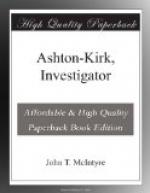Shortly before noon next day, Ashton-Kirk, in an immaculate morning suit, was ushered into the presence of Miss Edyth Vale. If he expected confusion, embarrassment or anything of that sort, he was disappointed; for she greeted him eagerly and with outstretched hand.
“This is a surprise,” she said.
He held her hand and looked meaningly at her.
“My appearances are sometimes surprising,” he said. “But I usually select the night for them; the effect is better then, you see.”
She smiled into his eyes.
“I have no doubt but that you are dreadfully mysterious,” she said. “But please sit down.”
She seated herself near the window; holding a book in her hand, she fluttered the leaves to and fro.
“The composure,” thought the investigator, as he sat down, “is somewhat overdone.”
“I wonder,” said Miss Vale, looking at the book, “if you are an admirer of Ibsen.” And as he nodded, she proceeded with a slight smile. “I know that he is scarcely the usual thing for a spring morning. But there are times when I simply can’t resist him.”
“He’s a strong draught at any time,” said Ashton-Kirk. “But his tonic quality is undoubted.”
“His disciples claim that for him, at any rate,” she answered. “But sometimes I question its truth. Where is the tonic effect of ‘Rosmersholm?’ I think it full of terrors.” She shuddered and added: “The White Horses will haunt me for weeks.”
“It’s the atmosphere of crime,” said he. “That quiet home on the western fiords reeks with it.”
She made a gesture of repulsion.
“It’s ghastly!” she exclaimed. “And, somehow, one feels it from the very first—before a word is spoken. Imagine Rebecca at the window, watching through the plants to see if Rosmer uses the footbridge from which his wife once leaped to her death.” She paused a moment, her eyes upon the open pages; then lifting her head, she asked: “What do you think of Rebecca?”
“A tremendous character—of wonderful strength. It was just such proud, dark, purposeful souls that Byron delighted to draw; but the only one in literature to whom I can fully liken her is the wife of Macbeth. There was the same ambition—the same ruthless will—the same disregard of everything that stood in her way. And, like Cawdor’s wife, she weakened in the end.”
She regarded him fixedly.
“Would you call it weakness?” she asked.
“She fell in love with Johannes, did she not? That was weakness—for her. She herself recognized it as such.”
The girl looked at him thoughtfully for a moment.
“That is true,” she said.
“Some of the world’s most daring and accomplished criminals have been women,” he went on. “But Nature never intended woman to be the bearer of burdens; there is a weakness in her soul structure somewhere; she usually sinks under the consciousness of guilt.”




